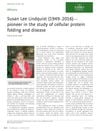 2 citations,
December 2016 in “EMBO journal”
2 citations,
December 2016 in “EMBO journal” Susan Lee Lindquist was a pioneering biologist who made significant contributions to understanding protein folding and its role in disease.
January 2022 in “Figshare” Autophagy helps mouse glands stay healthy, prevents early aging, and maintains their oil and scent production.
186 citations,
December 2012 in “Current opinion in cell biology” Keratin proteins are increasingly recognized as important for cell health and are linked to many diseases.
[object Object] 305 citations,
March 2008 in “AJP Endocrinology and Metabolism” SSAT is a key enzyme affecting cell growth and metabolism, with potential but risky use in disease treatment.
 16 citations,
December 2018 in “Plant Science”
16 citations,
December 2018 in “Plant Science” Elevated CO2 can lessen the negative impact of water shortage on soybean roots and affects specific genes.
 March 2024 in “Journal of Endocrinological Investigation”
March 2024 in “Journal of Endocrinological Investigation” Finasteride treatment in rats changed the expression of genes related to psychiatric and neurological functions, and these changes persisted after stopping the drug.
 40 citations,
December 2012 in “Epilepsia”
40 citations,
December 2012 in “Epilepsia” Neurosteroids change how GABA_A receptors work in the brain, which could be important for treating temporal lobe epilepsy.
 22 citations,
March 2012 in “Molecular Medicine Reports”
22 citations,
March 2012 in “Molecular Medicine Reports” DHT affects hair follicle cells by changing microRNA levels, leading to less cell growth and more cell death.

Blocking the Mitochondrial Pyruvate Carrier causes stress in hair follicles, which can be reduced by an ISR inhibitor.
 66 citations,
July 2007 in “Journal of Molecular Medicine”
66 citations,
July 2007 in “Journal of Molecular Medicine” Stress increases certain chemicals in the skin and nerves, which might worsen skin conditions.
10 citations,
March 2019 in “Journal of neuroendocrinology” Testosterone affects stress hormone levels differently in adolescent and adult male rats.
 20 citations,
November 2019 in “Biomolecules”
20 citations,
November 2019 in “Biomolecules” Finasteride reduces response to stress and rewards, affecting behavior and mental health.
CCC1 is essential for pH balance and normal cell function in plants.
 67 citations,
July 2016 in “Reviews in Endocrine and Metabolic Disorders”
67 citations,
July 2016 in “Reviews in Endocrine and Metabolic Disorders” Stress can worsen skin conditions by affecting hormone levels and immune response.
 375 citations,
July 2006 in “Journal of Investigative Dermatology”
375 citations,
July 2006 in “Journal of Investigative Dermatology” Stress can worsen skin and hair conditions by affecting the skin's immune response and hormone levels.
 August 2024 in “Archives of Women s Mental Health”
August 2024 in “Archives of Women s Mental Health” Women with PCOS have more depression and stress due to high androgen levels, not obesity or insulin resistance.
 31 citations,
January 2007 in “Journal of biological chemistry/The Journal of biological chemistry”
31 citations,
January 2007 in “Journal of biological chemistry/The Journal of biological chemistry” Stress activates a special function of the Vitamin D receptor with the help of c-Jun, which can also prevent cell death.
[object Object]  48 citations,
January 2011 in “Hormone Research in Paediatrics”
48 citations,
January 2011 in “Hormone Research in Paediatrics” The conclusion is that genetic changes in the glucocorticoid receptor can lead to conditions affecting stress response, immunity, and metabolism, requiring personalized treatment.
 70 citations,
March 2008 in “Mechanisms of Ageing and Development”
70 citations,
March 2008 in “Mechanisms of Ageing and Development” Maintaining DNA health in stem cells is key to preventing aging and tissue breakdown.
 11 citations,
March 2019 in “EMBO molecular medicine”
11 citations,
March 2019 in “EMBO molecular medicine” A defective protein in progeria causes cell death and atherosclerosis, but a treatment targeting cell stress may reduce these effects.
 August 2024 in “Plant Signaling & Behavior”
August 2024 in “Plant Signaling & Behavior” OsPRX83 helps rice survive stress by improving stress response and antioxidant activity.
 115 citations,
November 2004 in “Brain Behavior and Immunity”
115 citations,
November 2004 in “Brain Behavior and Immunity” Stress increases nerve fibers and immune cell activity in mouse skin, possibly worsening skin conditions.
 64 citations,
November 2012 in “EMBO reports”
64 citations,
November 2012 in “EMBO reports” Lamins are vital for cell survival, organ development, and preventing premature aging.
 7 citations,
October 2000 in “Allergo Journal”
7 citations,
October 2000 in “Allergo Journal” Stress may affect hair growth by influencing hair follicle development and could contribute to hair loss.
 6 citations,
April 2015 in “Behavioural Brain Research”
6 citations,
April 2015 in “Behavioural Brain Research” Finasteride worsens stress effects on sensory processes, possibly linking to anxiety/depression.
 5 citations,
October 2022 in “Frontiers in bioengineering and biotechnology”
5 citations,
October 2022 in “Frontiers in bioengineering and biotechnology” Ro stress hindered ginseng root growth and ginsenoside production, but increased certain hormones and affected gene regulation related to plant growth and stress responses.
 159 citations,
December 2007 in “American Journal of Pathology”
159 citations,
December 2007 in “American Journal of Pathology” Stress-related substance P may lead to hair loss and negatively affect hair growth.
 108 citations,
July 2004 in “American Journal of Pathology”
108 citations,
July 2004 in “American Journal of Pathology” Stress increases a factor in mice that leads to hair loss, and blocking this factor may prevent it.
 58 citations,
October 2016 in “Journal of Investigative Dermatology”
58 citations,
October 2016 in “Journal of Investigative Dermatology” Activating Nrf2 protects human hair follicles from oxidative stress and helps prevent hair growth inhibition.
 37 citations,
June 2021 in “Journal of the European Academy of Dermatology and Venereology”
37 citations,
June 2021 in “Journal of the European Academy of Dermatology and Venereology” Adult skin quickly reacts to short-term environmental and internal stress, leading to various skin issues and the need for protective measures.

























